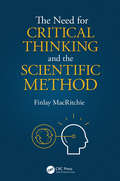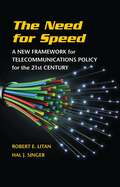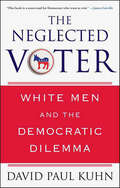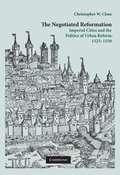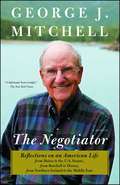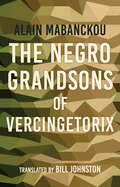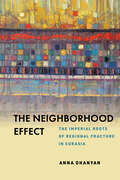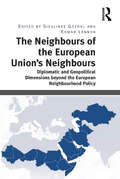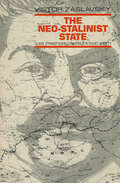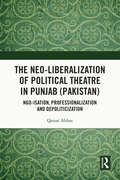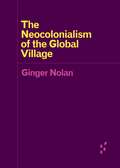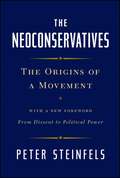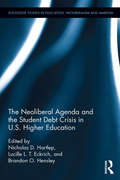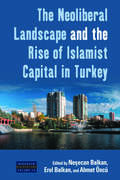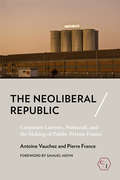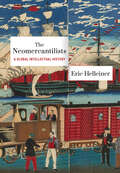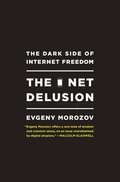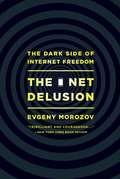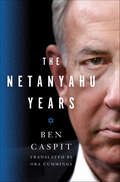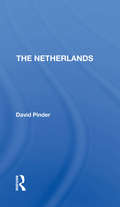- Table View
- List View
The Need for Critical Thinking and the Scientific Method
by Finlay MacRitchieThe book exposes many of the misunderstandings about the scientific method and its application to critical thinking. It argues for a better understanding of the scientific method and for nurturing critical thinking in the community. <P><P>This knowledge helps the reader to analyze issues more objectively, and warns about the dangers of bias and propaganda. The principles are illustrated by considering several issues that are currently being debated. These include anthropogenic global warming (often loosely referred to as climate change), dangers to preservation of the Great Barrier Reef, and the expansion of the gluten-free food market and genetic engineering.
The Need for Roots: Prelude to a Declaration of Obligations towards the Human Being (Routledge Classics Ser.)
by Simone WeilA new translation of Simone Weil's best-known work: a political, philosophical and spiritual treatise on what human life could beWhat do humans require to be truly nourished? Simone Weil, one of the foremost philosophers of the last century, envisaged us all as being bound by unconditional, eternal obligations towards every other human being. In The Need for Roots, her most famous work, she argued that our greatest need was to be rooted: in a community, a place, a shared past and collective future hopes. Written for the Free French movement while she was exiled in London during the Second World War, Weil's visionary combination of philosophy, politics and mysticism is her answer to the question of what life without occupation - and oppression - might be.'The patron saint of all outsiders' Andre Gide'The only great spirit of our time' Albert Camus Translated by Ros Schwartz, with an introduction by Kate Kirkpatrick.
The Need for Speed: A New Framework for Telecommunications Policy for the 21st Century
by Robert E. Litan Hal J. SingerThe twenty-first-century telecommunications landscape is radically different from the one that prevailed as recently as the last decade of the twentieth century. <P><P>Robert Litan and Hal Singer argue that given the speed of innovation in this sector, the Federal Communications Commission's outdated policies and rules are inhibiting investment in the telecom industry, specifically in fast broadband networks. This pithy handbook presents the kind of fundamental rethinking needed to bring communications policy in line with technological advances.Fast broadband has huge societal benefits, enabling all kinds of applications in telemedicine, entertainment, retailing, education, and energy that would have been unthinkable a few years ago. Those benefits would be even greater if the FCC adopted policies that encouraged more broadband providers, especially wireless providers, to make their services available in the roughly half of the country where consumers currently have no choice in wireline providers offering download speeds that satisfy the FCC's current standards.The authors' recommendations include allowing broadband providers to charge for premium delivery services; embracing a rule-of-reason approach to all matters involving vertical arrangements; stripping the FCC of its merger review authority because both the Federal Trade Commission and the Justice Department have the authority to stop anticompetitive mergers; eliminating the FCC's ability to condition spectrum purchases on the identity, business plans, or spectrum holdings of a bidder; and freeing telephone companies from outdated regulations that require them to maintain both a legacy copper network and a modem IP network.These changes and others advanced in this book would greatly enhance consumer welfare with respect to telecommunications services and the applications built around them.
The Neglected Voter: White Men and the Democratic Dilemma
by David Paul KuhnIn the 1960s, the Republican Party began to win over a crucial demographic: white male voters. Presidential politics was transformed for a generation.David Paul Kuhn explains this fundamental fact behind the rise of the Republicans and the decline of the Democrats, and reminds the political left that midterm victories (1986, 2006) do not always equal sustainable success. In revealing, lucid prose, Kuhn explains how America's conservative party came to win a majority of workingmen and the White House. Grounded in practical politics, The Neglected Voter presciently reconfigures the American political landscape. Equipped with unprecedented research data, reporting, and exclusive interviews with such figures as Jimmy Carter, Norman Mailer, Mark Warner, and Pat Robertson, Kuhn examines the role of gender and racial identity in presidential politics through the social changes that have defined the last half century.
The Negotiable Constitution
by Grégoire C. N. WebberIn matters of rights, constitutions tend to avoid settling controversies. With few exceptions, rights are formulated in open-ended language, seeking consensus on an abstraction without purporting to resolve the many moral-political questions implicated by rights. The resulting view has been that rights extend everywhere but are everywhere infringed by legislation seeking to resolve the very moral-political questions the constitution seeks to avoid. The Negotiable Constitution challenges this view. Arguing that underspecified rights call for greater specification, Grégoire C. N. Webber draws on limitation clauses common to most bills of rights to develop a new understanding of the relationship between rights and legislation. The legislature is situated as a key constitutional actor tasked with completing the specification of constitutional rights. In turn, because the constitutional project is incomplete with regards to rights, it is open to being re-negotiated by legislation struggling with the very moral-political questions left underdetermined at the constitutional level.
The Negotiated Reformation: Imperial Cities and the Politics of Urban Reform, 1525-1550
by Christopher W. CloseUtilizing evidence from numerous imperial cities, this book offers a new explanation for the spread and survival of urban reform during the sixteenth century. By analyzing the operation of regional political constellations, it reveals a common process of negotiation that shaped the Reformation in the Holy Roman Empire. It reevaluates traditional models of reform that leave unexplored the religious implications of flexible systems of communication and support among cities. Such networks influenced urban reform in fundamental ways, affecting how Protestant preachers moved from city to city, as well as what versions of the Reformation city councils introduced. This fusion of religion and politics meant that with local variations, negotiation within a regional framework sat at the heart of urban reform. The Negotiated Reformation therefore explains not only how the Reformation spread to almost every imperial city in southern Germany, but also how it survived imperial attempts to repress religious reform.
The Negotiator: A Memoir
by George J. MitchellCompelling, poignant, enlightening stories from former Senate Majority Leader George Mitchell about growing up in Maine, his years in the Senate, working to bring peace to Northern Ireland and the Middle East, and what he’s learned about the art of negotiation during every stage of his life.It’s a classic story of the American Dream. George Mitchell grew up in a working class family in Maine, experiencing firsthand the demoralizing effects of unemployment when his father was laid off from a lifelong job. But education was always a household priority, and Mitchell embraced every opportunity that came his way, eventually becoming the ranking Democrat in the Senate during the administrations of George H.W. Bush and Bill Clinton. Told with wit, frankness, and a style all his own, Senator Mitchell’s memoir reveals many insights into the art of negotiation. Mitchell looks back at his adventures in law and politics—including instrumental work on clean air and water legislation, the Iran-Contra hearings, and healthcare reform—as well as life after the Senate, from leading the successful Northern Ireland peace process, to serving as chairman of The Walt Disney Company, to heading investigations into the use of steroids in baseball and unethical activity surrounding the Olympic Games. Through it all, Senator Mitchell’s incredible stories—some hilarious, others tragic, all revealing—offer invaluable insights into critical moments in the last half-century of business, law, and politics, both domestic and international.
The Negro Grandsons of Vercingetorix (Global African Voices Ser.)
by Alain MabanckouThe award-winning author of Black Moses is at his satiric best in this novel the catalogs the pain and suffering caused by the ravages of civil war.Set in the imaginary African Republic of Vietongo, The Negro Grandsons of Vercingetorix begins when conflict breaks out between rival leaders and the regional ethnic groups they represent. Events recorded in a series of notebooks under the watchful eye of Hortense Lloki show how civil war culminates in a series of outlandish actions perpetrated by the warring parties’ private militias—the Anacondas and the Romans from the North who have seized power against Vercingetorix (named after none other than the legendary Gallic warrior who fought against Caesar’s army) and his Little Negro Grandsons in the South who are eager to regain control. Translated into English for the first time, this novel provides a gritty slice of life in an active war zone.“Nearly twenty years removed from its French publication, Mabanckou’s aptitude for characterization and his unflinching glimpse of plight echo within every movement of Vercingetorix . . . With The Negro Grandsons of Vercingetorix, Mabanckou stresses that even as violence is an accomplice to life, perseverance is synonymous.” —World Literature Today
The Neighborhood Effect: The Imperial Roots of Regional Fracture in Eurasia
by Anna OhanyanWhy are certain regions of the world mired in conflict? And how did some regions in Eurasia emerge from the Cold War as peaceful and resilient? Why do conflicts ignite in Bosnia, Donbas, and Damascus—once on the peripheries of mighty empires—yet other postimperial peripheries like the Baltics or Central Europe enjoy quiet stability? Anna Ohanyan argues for the salience of the neighborhood effect: the complex regional connectivity among ethnic-religious communities that can form resilient regions. In an account of Eurasian regional formation that stretches back long before the nation-state, Ohanyan refutes the notion that stable regions are the luxury of prosperous, stable, democratic states. She examines case studies from regions once on the fringes of the Habsburg, Ottoman, and Russian Empires to find the often-overlooked patterns of bonding and bridging, or clustering and isolation of political power and social resources, that are associated with regional resilience or fracture in those regions today. With comparative examples from Latin America and Africa, The Neighborhood Effect offers a new explanation for the conflicts we are likely to see emerge as the unipolar US-led order dissolves, making the fractures in regional neighborhoods painfully evident. And it points the way to the future of peacebuilding: making space for the smaller links and connections that comprise a stable neighborhood.
The Neighbours of the European Union's Neighbours: Diplomatic and Geopolitical Dimensions beyond the European Neighbourhood Policy
by Sieglinde Gstöhl Erwan LannonShould the European Neighbourhood Policy stop at the borders of the European Union’s immediate neighbouring countries? This book is the first full length study of the ’neighbours of the EU’s neighbours’, a concept originally introduced by the European Commission with reference to Saharan Africa, the Middle East and Central Asia. These regions in the EU’s broader neighbourhood are often perceived as an ’arc of crisis’ from which manifold challenges emanate for Europe. This timely book takes stock of the state of the EU’s cooperation with the neighbours of its neighbours and explores how the concept might help promote security, stability and prosperity beyond the countries which are formally part of the European Neighbourhood Policy. How can the EU create bridges between these regions? What instruments does the EU have at its disposal and how can it link them in order to respond to the challenges and overcome the current fragmentation? One of the conclusions is the suggestion to consider a pragmatic ’EU Strategy for the Neighbours of its Neighbours’ which addresses the needs of the broader EU neighbourhood in a more systematic and consistent manner and helps transform in the long run the ’arc of crisis’ into another ’ring of friends’.
The Nellie Massacre of 1983
by Makiko KimuraThe Nellie incident, involving the massacre of about 2,000 Muslim villagers, took place during the antiforeigner movement in Assam, in order to drive out illegal Bangladeshi and Nepali immigrants. Unlike the communal "riots" in the other parts of India from the 1980s to 2000s, this was an incident which took place in rural areas. The attackers were part of the indigenous tribal population, and Assamese Hindus of lower strata. The Nellie Massacre of 1983 is an attempt to search for clues from the narratives of attackers and survivors of the incident, which are fragmented and sometimes contradictory to each other. The key focus of the book is on the local decision-making processes of the riot agents in deciding to use collective violence against another group/community/ethnicity especially in the context of rural India. By using the case study of the Nellie massacre, the author attempts to argue that rioters have their own agency and decision-making power, and were not mere puppets of ideology and structural causes. Instead, they interpreted the circumstances in their own way and decided to riot.
The Neo-Stalinist State: Class Ethnicity & Consensus in Soviet Society
by Victor ZaslavskyUnderlying current controversies about environmental regulation are shared concerns, divided interests and different ways of thinking about the earth and our proper relationship to it. This book brings together writings on nature and environment that illuminate thought and action in this realm.
The Neo-liberalization of Political Theatre in Punjab (Pakistan): NGO-isation, Professionalization and Depoliticization
by Qaisar AbbasThis book is about the four-decade-long struggle of political theatre in the post-colonial society of Pakistan, which started as a response to the dictatorship. It is the cultural history of Pakistan that stands at the intersection of theatre, people’s dreams about a progressive and socialist Pakistan, political movements, the cultural intelligentsia of the country, and the neoliberal regimes of NGOs and foreign donors. This book explores some of the major questions about contemporary cultural politics in the country, for example, ‘what is the relationship between politics and performance?’ ‘What is the term “political theatre” in the historic, cultural, and political context of Pakistan?’ ‘What is the aesthetics of political theatre?’ ‘How does a cultural product make meaning?’ What do a political theatre company's working processes and organizational structures look like?’ By focusing on the creative work of leading theatre companies of Pakistan, including Ajoka, Punjab Lok Rahs, Sangat, and Azad, this study is a unique journey into their rehearsal rooms behind the public stages to see how a theatre play is conceived, rehearsed, produced, and performed. It is the analysis of the aesthetical politics of these companies, covering all the stages of theatre performance from production to reception. Through this cultural inquiry, the book explores the themes of cultural activism, resistance, volunteerism, leftist politics, de-colonization, funding, NGO-isation, professionalization, and de-politicization. The book will be of great interest to students and scholars with an interest in Political Theatre, Applied Theatre, and Cultural Activism.
The Neocolonialism of the Global Village (Forerunners: Ideas First #55)
by Ginger NolanUncovering a vast maze of realities in the media theories of Marshall McLuhan The term &“global village&”—coined in the 1960s by Marshall McLuhan—has persisted into the twenty-first century as a key trope of techno-humanitarian discourse, casting economic and technical transformations in a utopian light. Against that tendency, this book excavates the violent history, originating with techniques of colonial rule in Africa, that gave rise to the concept of the global village. To some extent, we are all global villagers, but given the imbalances of semiotic power, some belong more thoroughly than others. Reassessing McLuhan&’s media theories in light of their entanglement with colonial and neocolonial techniques, Nolan implicates various arch-paradigms of power (including &“terra-power&”) in the larger prerogative of managing human populations.Forerunners: Ideas First is a thought-in-process series of breakthrough digital publications. Written between fresh ideas and finished books, Forerunners draws on scholarly work initiated in notable blogs, social media, conference plenaries, journal articles, and the synergy of academic exchange. This is gray literature publishing: where intense thinking, change, and speculation take place in scholarship.
The Neoconservatives
by Peter SteinfelsIn 1979, Peter Steinfels identified a new movement and predicted it would be the decadee(tm)s most enduring legacy to American politics. In a new Introduction he describes its evolution from a reaction to Sixties' social change into an entrenched political force promoting an assertive, even belligerent, foreign policy. The Neoconservatives traced the origins and described the beliefs of a movement that had barely been labeled. Four decades later, the neoconservatives have become the eoeneocons,e advising presidential candidates, manning think tanks, churning out books, op-eds, TV interviews, and policy proposals. They played a key role in pushing the nation into the war in Iraq and continue to argue for an assertive American foreign policy, whether toward Iran, Afghanistan, North Korea, or China, that does not hesitate to act unilaterally with military power. The Neoconservatives probes the roots of this movement as it describes its early days with portraits of Irving Kristol, Daniel P. Moynihan, Daniel Bell, Nathan Glazer, Samuel Huntington, and others. Peter Steinfels was the first critic to understand and gauge an emerging philosophy that would grow into an enduring force at the forefront of American foreign policy making. The Neoconservatives is an important contribution to our political history.
The Neoliberal Agenda and the Student Debt Crisis in U.S. Higher Education: Indebted Collegians of the Neoliberal American University (Routledge Studies in Education, Neoliberalism, and Marxism)
by Nicholas D. Hartlep Brandon O. Hensley Lucille L.T. EckrichCapturing the voices of Americans living with student debt in the United States, this collection critiques the neoliberal interest-driven, debt-based system of U.S. higher education and offers alternatives to neoliberal capitalism and the corporatized university. Grounded in an understanding of the historical and political economic context, this book offers auto-ethnographic experiences of living in debt, and analyzes alternatives to the current system. Chapter authors address real questions such as, Do collegians overestimate the economic value of going to college? and How does the monetary system that student loans are part of operate? Pinpointing how developments in the political economy are accountable for students’ university experiences, this book provides an authoritative contribution to research in the fields of educational foundations and higher education policy and finance.
The Neoliberal Landscape and the Rise of Islamist Capital in Turkey
by NeÅecan Balkan Erol Balkan Ahmet ÖncüIslamist capital accumulation has split the Turkish bourgeoisie and polarized Turkish society into secular and religious social groupings, giving rise to conflicts between the state and political Islam. By providing a long-term historical perspective on Turkey's economy and its relationship to Islamism, this volume explores how Islamism as a political ideology has been utilized by the conservative bourgeoisie in Turkey, and elsewhere, to establish hegemony over labor. The contributors analyze the relationship between neoliberalism and the political fortunes of the Islamist Justice and Development Party (AKP), and examine the similarities and differences amongst new factions in the secular and Islamic middle class that have benefited economically, socially, and culturally during the AKP's reign. The articles also investigate the impact of the Gülen Movement and the role of the media in shaping the contours of intra-class struggle within contemporary Turkish political and social life.
The Neoliberal Republic: Corporate Lawyers, Statecraft, and the Making of Public-Private France (Corpus Juris: The Humanities in Politics and Law)
by Antoine Vauchez Pierre FranceThe Neoliberal Republic traces the corrosive effects of the revolving door between public service and private enrichment on the French state and its ability to govern and regulate the private sector. Casting a piercing light on this circulation of influence among corporate lawyers and others in the French power elite, Antoine Vauchez and Pierre France analyze how this dynamic, a feature of all Western democracies, has developed in concert with the rise of neoliberalism over the past three decades. Based on interviews with dozens of public officials in France and a unique biographical database of more than 200 civil-servants-turned-corporate-lawyers, The Neoliberal Republic explores how the always-blurred boundary between public service and private interests has been critically compromised, enabling the transformation of the regulatory state into either an ineffectual bystander or an active collaborator in the privatization of public welfare. The cumulative effect of these developments, the authors reveal, undermines democratic citizenship and the capacity to imagine the public good.
The Neoliberals: Creating the New American Politics
by Randall RothenbergThe Neoliberals: Creating The New American Politic
The Neomercantilists: A Global Intellectual History
by Eric HelleinerAt a time when critiques of free trade policies are gaining currency, The Neomercantilists helps make sense of the protectionist turn, providing the first intellectual history of the genealogy of neomercantilism. Eric Helleiner identifies many pioneers of this ideology between the late eighteenth and early twentieth centuries who backed strategic protectionism and other forms of government economic activism to promote state wealth and power. They included not just the famous Friedrich List, but also numerous lesser-known thinkers, many of whom came from outside of the West. Helleiner's novel emphasis on neomercantilism's diverse origins challenges traditional Western-centric understandings of its history. It illuminates neglected local intellectual traditions and international flows of ideas that gave rise to distinctive varieties of the ideology around the globe, including in Latin America, the Caribbean, Africa, and Asia. This rich history left enduring intellectual legacies, including in the two dominant powers of the contemporary world economy: China and the United States. The result is an exceptional study of a set of profoundly influential economic ideas. While rooted in the past, it sheds light on the present moment. The Neomercantilists shows how we might construct more global approaches to the study of international political economy and intellectual history, devoting attention to thinkers from across the world, and to the cross-border circulation of thought.
The Net Delusion
by Evgeny Morozov"The revolution will be Twittered!" declared journalist Andrew Sullivan after protests erupted in Iran in June 2009. Yet for all the talk about the democratizing power of the Internet, regimes in Iran and China are as stable and repressive as ever. In fact, authoritarian governments are effectively using the Internet to suppress free speech, hone their surveillance techniques, disseminate cutting-edge propaganda, and pacify their populations with digital entertainment. Could the recent Western obsession with promoting democracy by digital means backfire? In this spirited book, journalist and social commentator Evgeny Morozov shows that by falling for the supposedly democratizing nature of the Internet, Western do-gooders may have missed how it also entrenches dictators, threatens dissidents, and makes it harder--not easier--to promote democracy. Buzzwords like "21st-century statecraft" sound good in PowerPoint presentations, but the reality is that "digital diplomacy" requires just as much oversight and consideration as any other kind of diplomacy. Marshaling compelling evidence, Morozov shows why we must stop thinking of the Internet and social media as inherently liberating and why ambitious and seemingly noble initiatives like the promotion of "Internet freedom" might have disastrous implications for the future of democracy as a whole.
The Net Delusion
by Evgeny Morozov"The revolution will be Twittered!" declared journalist Andrew Sullivan after protests erupted in Iran in June 2009. Yet for all the talk about the democratizing power of the Internet, regimes in Iran and China are as stable and repressive as ever. In fact, authoritarian governments are effectively using the Internet to suppress free speech, hone their surveillance techniques, disseminate cutting-edge propaganda, and pacify their populations with digital entertainment. Could the recent Western obsession with promoting democracy by digital means backfire? In this spirited book, journalist and social commentator Evgeny Morozov shows that by falling for the supposedly democratizing nature of the Internet, Western do-gooders may have missed how it also entrenches dictators, threatens dissidents, and makes it harder--not easier--to promote democracy. Buzzwords like "21st-century statecraft" sound good in PowerPoint presentations, but the reality is that "digital diplomacy" requires just as much oversight and consideration as any other kind of diplomacy. Marshaling compelling evidence, Morozov shows why we must stop thinking of the Internet and social media as inherently liberating and why ambitious and seemingly noble initiatives like the promotion of "Internet freedom" might have disastrous implications for the future of democracy as a whole.
The Net Delusion: The Dark Side of Internet Freedom
by Evgeny MorozovEvgeny Morozov offers a rare note of wisdom and common sense, on an issue overwhelmed by digital utopians.
The Netanyahu Years
by Ben CaspitBenjamin Netanyahu is currently serving his fourth term in office as Prime Minister of Israel, the longest serving Prime Minister in the country’s history. Now Israeli journalist Ben Caspit puts Netanyahu’s life under a magnifying glass, focusing on his last two terms in office. "A biography of the steely Israeli prime minister that underscores his relentless, seemingly emotionless competitive drive … A highly readable portrait of an enigmatic politician." - Kirkus Reviews Caspit covers a wide swath of topics, including Netanyahu’s policies, his political struggles, and his fight against the Iranian nuclear program, and zeroes in on Netanyahu’s love/hate relationship with the American administration, America’s Jews, and his alliances with American business magnates. A timely and important book, The Netanyahu Years is a primer for anyone looking to understand this world leader.
The Netherlands
by David PinderOne popular view of the Netherlands is that of a society oriented towards agriculture and associated processing industries. But although these activities enjoy greater prominence than in most developed countries, in reality the Dutch economy is based on a broad range of manufacturing, the extent and character of which has experienced rapid evolutio
